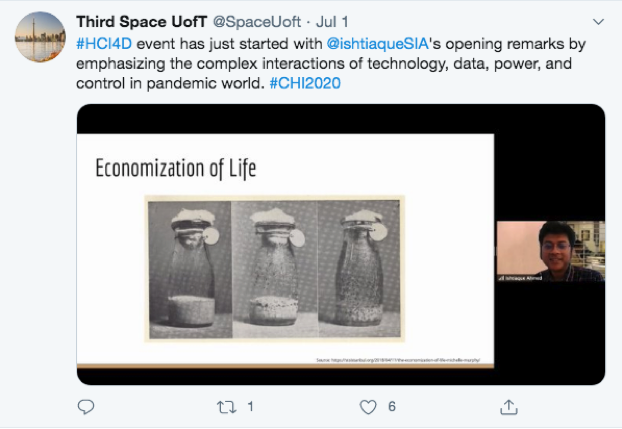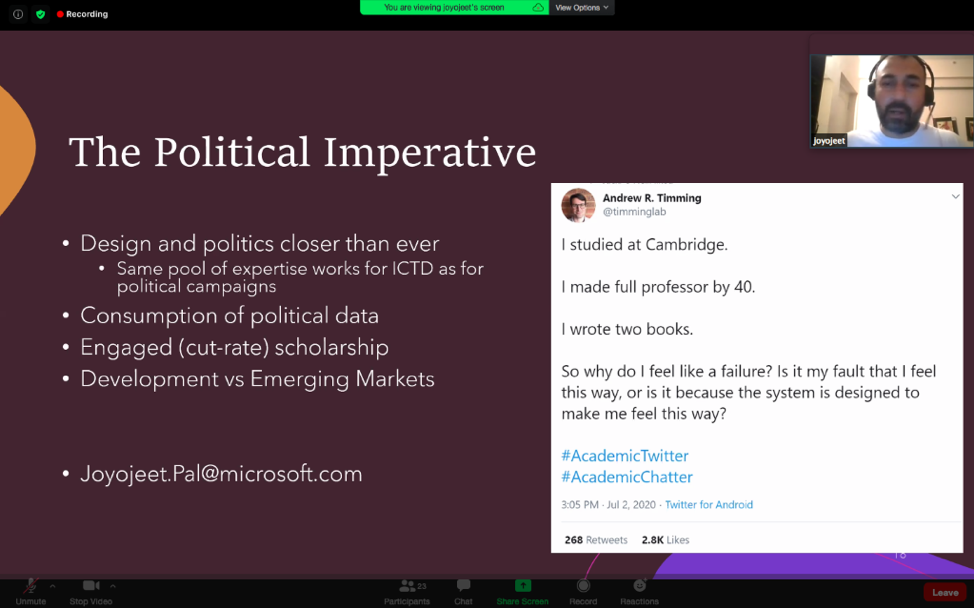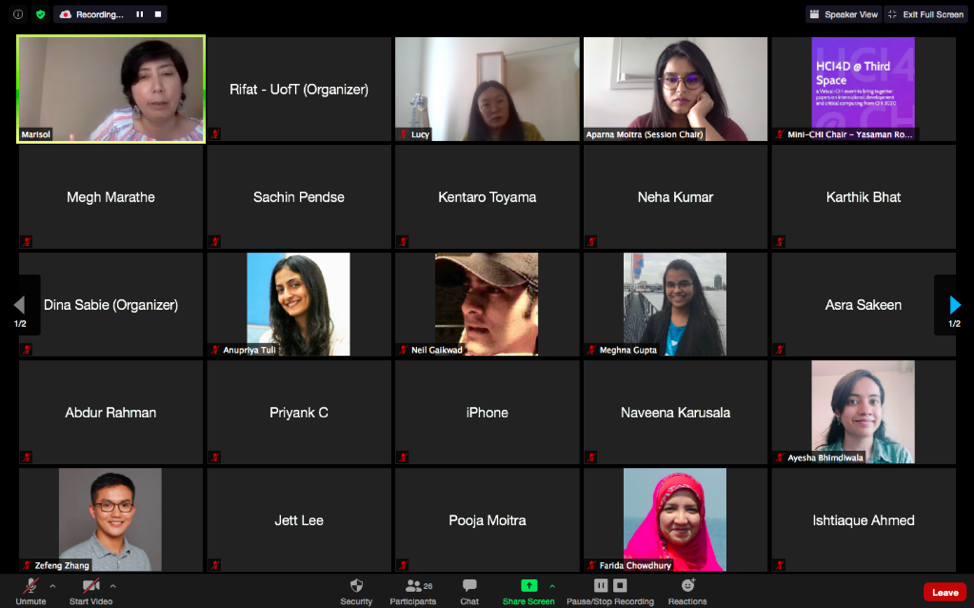Congratulations to Mohammad Rashidujjaman Rifat, Toha Toriq, and Syed Ishtiaque Ahmed. Their paper titled, “Persuasion, Habit, and Sustainability: Designing for and Lessons from Islamic Religious Culture in Bangladesh,” has been accepted to CSCW 2020!
Monthly Archives: July 2020
Yasaman Rohanifar Awarded Ontario Graduate Scholarship
Congratulations to Yasaman for being awarded a 2020-2021 Ontario Graduate Scholarship. The OGS is awarded to students for academic achievement, so the congrats again on a job well done Yasaman!
Thirdspace hosts 2-day event for CHI 2020
Third Space research group at the DGP lab organized a two-day virtual HCI4D event on July 1-2, 2020. This event brought together papers on critical computing and international development published at CHI 2020. 22 papers from four different continents were presented at this event and 210 participants from across the world registered to attend this virtual event. The program featured research on diverse areas including healthcare, accessibility, migration, automation, communication among communities, and design. Two keynote speakers— Prof. Ishtiaque Ahmed from the University of Toronto and Prof. Joyojeet Pal from Microsoft Research, India—delivered thought-provoking speeches on Hope and Political imperatives of development research.
CHI is the largest conference for research related to human-computer interaction (HCI) and this year it was canceled due to the COVID-19 pandemic. As a result, researchers across the world lost an opportunity to present their works to larger audiences. Many regional HCI communities, research domain-specific groups, and universities stepped forward and organized virtual CHI events at different scales. The events presented subsets of CHI 2020 papers. The Third Space research group joined them and organized this event to showcase HCI for Development (HCI4D) papers from CHI 2020.
Figure 1: Two keynote speakers. (left) Prof. Ishtiaque Ahmed talking about Hope and design. (right) Prof. Joyojeet Pal is talking about the political imperatives of development.
The two–day program began at 8:30 am in the morning and went on until 5:00 pm EDT. Prof. Ishtiaque Ahmed delivered the opening keynote presenting some critical reflections delving into Prof. Michelle Murphy’s conception of “economization of life” and concluded by sharing ideas on integrating “hope” with design. The paper presentation sessions were initiated after the opening keynote. The event was divided into a total of six sessions with each session being two hours long. Three to four papers were presented in each session and were categorized based on the shared themes of the paper. Each paper was given 15 minutes for presentation and five minutes for a question-answer (Q&A) session. At the end of each session, based on the preferences of the participants, there were options to move forth with an extended Q&A session or create breakout rooms for participants to socialize with each other. Since one of the key goals of conducting this event was to provide ample opportunities to participants for socializing, we created several breakout rooms on Zoom so that participants could meet each other and socialize. The program concluded with an honest and engaging closing keynote by Prof. Joyojeet Pal on the political imperatives in HCI4D research.
Figure 2: A subset of participants.
Twitter buzz created around the two-day event as well as positive feedback shared by participants at the end of the session break-out rooms were very encouraging and inspired the organizers to hold similar programs at regular intervals. Its virtual nature provided participation and networking opportunities to emerging HCI4D researchers, especially from the Global South who are otherwise unable to participate and network internationally due to various resource constraints. The Third Space research group hopes to organize this event at a larger scale next year onwards, collaborating with more diverse researchers and presenting research published in CHI as well as other HCI4D venues.
Renowned Experts Launch First-of-its-Kind Book on COVID-19 Problems and Solutions
The COVID-19 Solutions Guide provides tools for readers that assist them with the pandemic’s personal, financial, and emotional impacts.
TORONTO, Canada, July 2, 2020: In response to the impacts of COVID-19 on society, recently we launched the e-book The COVID-19 Solutions Guide. This innovative publication provides many solutions for current issues. A blog provides regular updates.
COVID-19 has disrupted economic growth, social norms, health and safety. Over 11 million individuals worldwide have been infected; over 525,000 have died, 131,000 of them in the USA.
The authors are well qualified to write this book. Dr. Ronald Baecker is Emeritus Professor of Computer Science and Bell Chair in Human-Computer Interaction at the University of Toronto, as well as co-founder and namer of DGP.. Dr. Gary Feldman is a retired physician who served as the Public Health Officer of Ventura County and Riverside County in California for 14 years. Professor Judith Langer is a Distinguished Emeritus Professor of Education who specializes in language, literacy, and learning. Justin Stein is a financial advisor with a practice focused on helping families and business owners protect and manage risk.
The COVID-19 Solutions Guide is now available for purchase on the team’s website and at Lulu Books. It will soon also be available on the Kindle, Nook, and Kobo.




